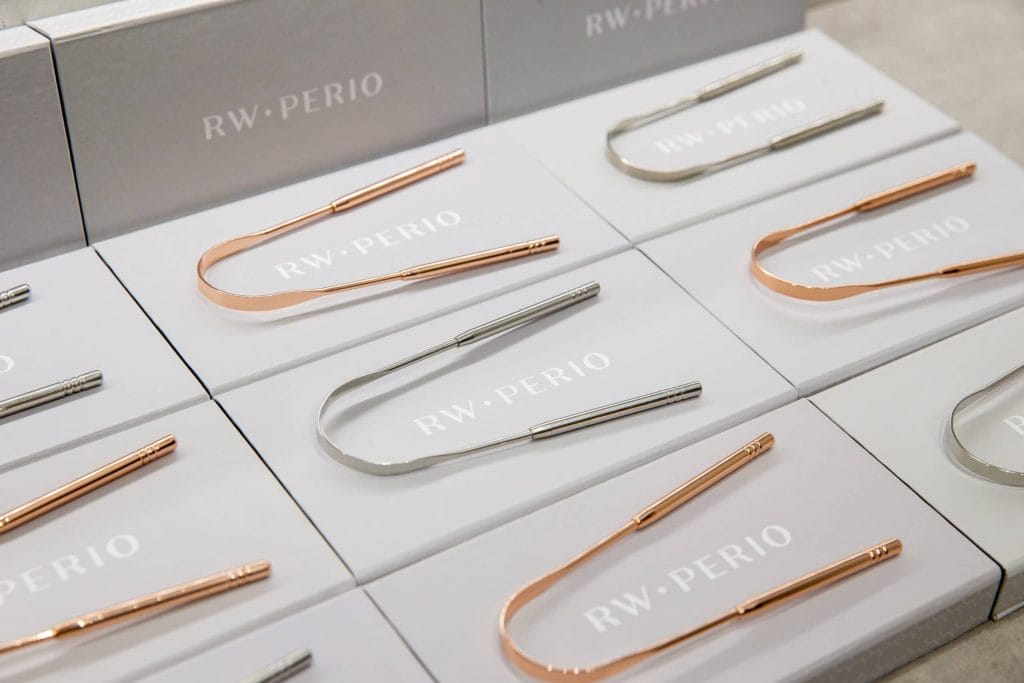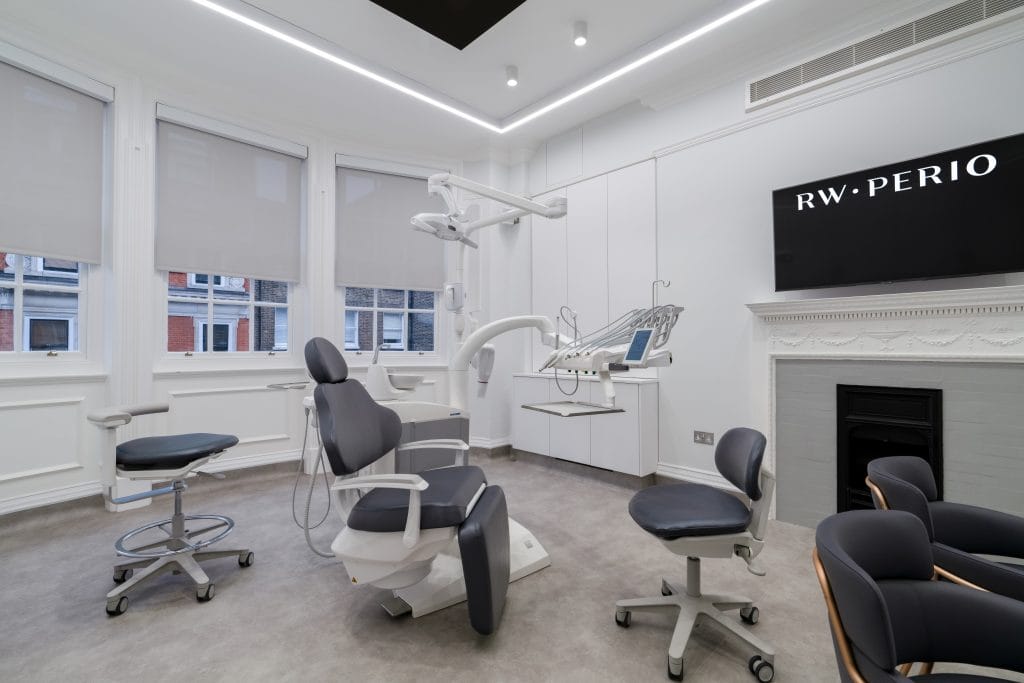Maintaining strong teeth and healthy gums goes beyond brushing and flossing. Your diet plays a crucial role in dental health, and ensuring you get the right vitamins can make a significant difference. If you’re looking for expert gum treatment, a periodontist in London can provide specialised care. Below are the top five vitamins essential for optimal oral health.
1. Vitamin D – The Calcium Absorber for Strong Teeth & Healthy Gums
Vitamin D is vital for strong teeth because it helps your body absorb calcium efficiently. Without enough Vitamin D, your teeth may become brittle, increasing the risk of decay and gum disease.
Sources of Vitamin D:
- Sunlight exposure
- Fatty fish (salmon, mackerel)
- Egg yolks
- Fortified dairy products
2. Vitamin C – The Gum Protector for Better Periodontal Health
Vitamin C is essential for maintaining gum health. It strengthens blood vessels and connective tissues, reducing the risk of gum inflammation and bleeding (gingivitis). A deficiency in Vitamin C can lead to scurvy, which severely affects oral health.
Sources of Vitamin C:
- Citrus fruits (oranges, lemons)
- Strawberries
- Bell peppers
- Leafy greens
3. Calcium – The Tooth Enforcer for Stronger Teeth
Calcium is the building block of teeth and bones. Without enough calcium, your teeth can weaken, leading to cavities and tooth loss. Visiting our gum specialist in London can help ensure you’re maintaining optimal oral health.
Sources of Calcium:
- Dairy products (milk, cheese, yoghurt)
- Almonds
- Leafy greens (kale, spinach)
- Sardines
4. Vitamin A – The Saliva Booster for Oral Protection
Vitamin A is responsible for maintaining healthy saliva production, which helps wash away bacteria and food particles, preventing plaque buildup. It also plays a role in the development of strong enamel.
Sources of Vitamin A:
- Carrots
- Sweet potatoes
- Liver
- Spinach
5. Vitamin K – The Enamel Protector for Long-Term Gum Health
Vitamin K works as a shield for your teeth by helping to block substances that break down enamel. It also supports bone metabolism, ensuring your jawbone remains strong and your teeth stay firmly in place. For expert advice, consult our London periodontist team which specialises in gum treatment.
Sources of Vitamin K:
- Leafy greens (kale, spinach, broccoli)
- Fermented foods
- Cheese
- Meat
Keep Your Gums Healthy with RW Perio
A well-balanced diet rich in these essential vitamins can significantly improve your gum health. Alongside regular dental check-ups, good oral hygiene, and a healthy lifestyle, these nutrients will keep your teeth and gums in top shape for years to come!
If you’re experiencing gum disease, receding gums, or other periodontal concerns, book a consultation with RW Perio, your trusted periodontist in London. Contact us today to take the first step towards healthier gums and a confident smile!
Understanding Tooth Enamel
What Is Tooth Enamel?
Tooth enamel is the hard, outermost layer of your teeth. It acts as a protective barrier against daily wear and tear, safeguarding your teeth from decay, bacteria, and damage. Despite being the hardest substance in the human body, enamel is not indestructible and does not regenerate once lost.
The Importance of Enamel in Dental Health
Enamel plays a crucial role in maintaining strong and healthy teeth. It helps prevent cavities, reduces tooth sensitivity, and ensures a bright, white smile. Without it, your teeth become more vulnerable to decay, breakage, and discolouration. Maintaining good gum health is also essential in preventing enamel erosion, making regular visits to a periodontist in London vital for overall oral health.
Signs of Tooth Enamel Loss
Increased Tooth Sensitivity
If you experience discomfort when consuming hot, cold, or sugary foods and drinks, this may be a sign of enamel erosion. As enamel wears down, the underlying dentin becomes exposed, making teeth more sensitive.
Discolouration and Transparency
Enamel loss can cause your teeth to appear yellowish, as the dentin beneath becomes more visible. In severe cases, the edges of the teeth may look translucent.
Cracks, Chips, and Rough Edges
Weakened enamel makes teeth more prone to physical damage, leading to cracks, chips, or rough surfaces.
Increased Cavities and Decay
Since enamel protects against bacteria and acids, its erosion makes teeth more susceptible to cavities, which can lead to more serious dental problems if left untreated.
Causes of Tooth Enamel Loss
Acidic Foods and Drinks
Frequent consumption of acidic foods and beverages, such as citrus fruits, fizzy drinks, and wine, can erode enamel over time.
Poor Oral Hygiene Habits
Failing to brush and floss properly can lead to plaque buildup, increasing the risk of enamel damage and gum disease.
Teeth Grinding and Clenching (Bruxism)
Grinding your teeth, whether during sleep or due to stress, can wear down the enamel, leading to increased sensitivity and tooth damage.
Acid Reflux and Medical Conditions
Gastroesophageal reflux disease (GERD) and other conditions that cause stomach acid to reach the mouth can accelerate enamel erosion.
Overuse of Whitening Products
Excessive use of whitening products, especially those with high concentrations of peroxide, can weaken enamel over time.
How to Protect Your Tooth Enamel
Maintain a Balanced Diet
Eating a diet rich in calcium, phosphorus, and vitamins helps strengthen enamel. Dairy products, leafy greens, and nuts are excellent choices.
Use Fluoride for Enamel Strengthening
Fluoride helps reinforce enamel, making it more resistant to acids. Using fluoride toothpaste and drinking fluoridated water can help maintain strong teeth.
Practice Proper Oral Hygiene
Brushing twice daily with a soft-bristled toothbrush and flossing regularly helps prevent plaque buildup and enamel erosion.
Avoid Acidic and Sugary Foods
Limiting acidic and sugary foods reduces the risk of enamel erosion and tooth decay.
Wear a Mouthguard for Grinding
A custom-fitted mouthguard can prevent enamel loss caused by teeth grinding.
Stay Hydrated and Chew Sugar-Free Gum
Drinking plenty of water helps rinse away acids and bacteria, while sugar-free gum stimulates saliva production, which naturally protects enamel.
Can Tooth Enamel Be Rebuilt?
The Role of Remineralisation
While lost enamel cannot regenerate, remineralisation can help strengthen and restore weakened areas. Fluoride treatments and remineralising toothpaste can aid in this process.
When to See a Dentist
Warning Signs That Require Professional Care
If you experience persistent tooth sensitivity, visible damage, or frequent cavities, it’s essential to seek professional dental care.
Conclusion
Tooth enamel plays a vital role in maintaining strong, healthy teeth. By adopting good oral hygiene practices, making dietary adjustments, and seeking professional dental care when necessary, you can protect your enamel and overall gum health. If you’re concerned about your gum health, consult our periodontist in London for expert advice on maintaining optimal oral health.
FAQs
Can enamel loss be reversed naturally? While lost enamel cannot grow back, remineralisation can help strengthen weakened areas with the help of fluoride and proper dental care.
How do I know if my enamel is thinning? Increased sensitivity, discolouration, and rough edges on your teeth are common signs of enamel erosion.
Is enamel loss a sign of ageing? While enamel naturally wears down over time, lifestyle habits and dietary choices can accelerate its erosion at any age. For expert care and periodontal treatment, visit RW Perio, London’s leading periodontist, to ensure your gums stay healthy for years to come.
The Hidden Battle Between Your Mind and Your Gums
Imagine your gums as a frontline soldier, constantly fighting an invisible war against infection. The enemy? Plaque—that sticky bacterial film that creeps along your teeth, causing inflammation and weakening your oral defences. But here’s the twist: stress is the secret weapon compromising your gum health. Gum disease isn’t just about bad breath or bleeding gums.
It’s a serious infection that can destroy the tissues supporting your teeth, potentially leading to tooth loss. And in the pressure cooker of modern life—especially in London—your gums are taking a beating.
City Life’s Stress Epidemic on Your Oral Health, Especially your Gums
74% of London adults are constantly stressed. Work pressures, financial anxiety, and the city’s relentless pace turn stress into a silent health destroyer. But it’s not just about feeling overwhelmed—stress is wreaking havoc on your body’s natural defences.
When stressed, your body becomes a hormone factory, pumping out cortisol and adrenaline. These stress hormones don’t just give you headaches and sleepless nights—they systematically weaken your immune system, leaving your gums vulnerable to bacterial invasion.
The Shocking Numbers
- 30% of London adults aged 25-40 show signs of gum disease
- Stressed individuals are nearly twice as likely to develop serious gum problems
- Chronic stress can reduce your immune system’s ability to fight oral infections by up to 40%
How Stress Wages War on Your Gums
Stress doesn’t just sit in the background—it actively attacks your oral health:
- Elevated cortisol levels reduce immune system effectiveness
- Increased teeth grinding and jaw clenching put extra pressure on gum tissues
- Compromised immune responses make you more susceptible to bacterial infections
Your Stress-Releasing, Gum-Protecting Action Plan
Lifestyle Strategies for Healthier Gums
- Prioritise sleep: Aim for 7-8 hours of quality rest
- Exercise regularly: Even 30 minutes of daily activity can reduce stress
- Practice mindfulness: Meditation, deep breathing, or yoga can lower cortisol levels
Oral Health Tactics
- Brush twice daily with a soft-bristled toothbrush
- Floss consistently to remove hidden plaque
- Use an antimicrobial mouthwash
- Schedule professional cleanings at least twice a year
Don’t Wait—Take Action Now for Gum Disease
Gum disease is a progressive condition. The earlier you address it, the better your chances of preventing serious damage. While a completely stress-free life might be unrealistic, you can take control of both your mental well-being and oral health.
Your Next Steps
- Book a dental checkup
- Implement stress-reduction techniques
- Commit to a consistent oral hygiene routine
Located in the city and concerned about your gum health? Book an appointment with our expert periodontist on Harley Street today. Your gums—and your peace of mind—will thank you.
The Ancient Wisdom You’ve Been Missing: Tongue Scraper
Ever wonder why your breath still isn’t fresh after brushing? Your tongue might be the culprit. While many of us diligently brush and floss, we’re overlooking a crucial player in our oral hygiene game: the tongue scraper. This simple yet powerful tool has been a cornerstone of oral health for millennia.
Ancient cultures were onto something – tongue scraper, or “jihwa prakshalana” in Ayurvedic medicine, has been practised for thousands of years. Traditional Chinese medicine also emphasises tongue cleaning as a way to maintain overall health. These ancestral practices weren’t just based on tradition – modern science is now validating their wisdom.
The Science Behind the Scrape
Your tongue is essentially a bacterial playground. Its rough, papillae-covered surface creates the perfect environment for microorganisms to thrive. Throughout the day, it collects:
- Dead cells from your mouth’s natural shedding process
- Food debris from everything you eat and drink
- Bacteria that feed on these particles
- Volatile sulfur compounds that cause bad breath
This accumulation forms that white or yellow coating you might notice in the morning. While brushing your tongue with a toothbrush might seem like a good solution, it’s surprisingly ineffective on its own. A toothbrush is designed for the hard, smooth surface of teeth – not the textured landscape of your tongue.
The Flavour Enhancement Factor
Here’s where things get interesting: tongue scrapers can enhance your culinary experience. The coating that builds up on your tongue doesn’t just look unpleasant – it dulls your taste receptors. By removing this barrier, you’re allowing your taste buds to fully connect with what you’re eating and drinking.
Many users report that after regular tongue scraping:
- Coffee tastes richer and more nuanced
- Sweet flavours become more distinct
- Subtle herb and spice notes are more noticeable
- The overall dining experience becomes more enjoyable
The Fresh Breath Connection
Bad breath affects nearly 50% of adults at some point, and that tongue coating is often the hidden culprit. The bacteria residing on your tongue produce volatile sulfur compounds (VSCs) – the primary cause of halitosis. Clinical studies have shown that regular tongue scraping can reduce these VSCs by up to 75%, which is significantly more effective than brushing alone.
Choosing Your Scraper: Material Matters
Not all tongue scrapers are created equal. Here’s what to consider:
Stainless Steel
- Most durable option
- Easiest to clean and sterilise
- Can last for years with proper care
- Typically more effective at removing tongue coating
- More environmentally friendly due to longevity
Copper
- Traditional Ayurvedic material
- Natural antimicrobial properties
- Develops a patina over time
- May need more frequent replacement
Plastic
- More affordable initially
- Good for beginners
- Less durable
- May need frequent replacement
- Not as environmentally friendly
The Proper Technique
Using a tongue scraper effectively is simple but requires the right approach:
- Start first thing in the morning, before eating or drinking
- Stick your tongue out comfortably
- Place the scraper at the back of your tongue (as far as comfortable)
- Apply gentle pressure
- Pull the scraper forward in one smooth motion
- Rinse the scraper between strokes
- Repeat 2-3 times
- Clean your scraper thoroughly and let it dry
Beyond Fresh Breath: Additional Benefits
Regular tongue scraping offers surprising benefits beyond the obvious:
- Improved Digestive Health: By removing bacteria and toxins, you’re preventing them from being ingested
- Better Oral Immunity: Reducing bacterial load helps your mouth’s natural defences
- Cleaner Teeth: Less bacteria in your mouth means less potential for tooth decay
- Reduced Tongue Coating: Regular scraping prevents heavy buildup
- Enhanced Oral Awareness: You’ll become more attuned to your oral health
Making It a Habit
Like any health practice, consistency is key. Keep your tongue scraper visible near your toothbrush as a reminder. Consider it as essential as brushing – because it is. The process takes less than a minute but can significantly impact oral health and overall well-being.
Remember, your mouth is the gateway to your body’s health. By incorporating tongue scraping into your daily routine, you’re not just freshening your breath – you’re participating in an ancient practice that modern science continues to validate. Your taste buds, breath, and oral health will thank you.
Ready to transform your oral hygiene routine? At RW Perio, we highly recommend starting with the clinical standard By Dr Reena Tongue Scraper and giving it at least two weeks of consistent use. You might be surprised at how much cleaner and fresher your mouth feels – and how much more you enjoy your favourite foods and beverages.
Ready to Upgrade Your Oral Care with By Dr Reena?
Maintaining exceptional oral hygiene is more than just brushing twice a day – it’s about integrating holistic care into your daily routine. Dr Reena, a trusted expert in periodontics, brings a range of thoughtfully designed products that not only promote oral health but also elevate your daily self-care rituals. Whether you’re looking to enhance your lip care routine, improve tongue hygiene, or cleanse your mouth thoroughly, By Dr Reena’s collection combines science, precision, and luxury for a superior oral care experience.
1. The Mouth Cleanse: Refresh and Rejuvenate

For a refreshing cleanse that leaves your mouth feeling revitalised, By Dr Reena’s Mouth Cleanse is your go-to product. This unique mouthwash is formulated to combat harmful bacteria while providing a soothing, fresh feel after every use. Its gentle formula is designed to support periodontal health, making it ideal for individuals with sensitive gums or those undergoing periodontal treatment.
Regular use of the Mouth Cleanse helps maintain a balanced oral microbiome, reducing the risk of infections and promoting overall gum health. It’s the perfect companion to your daily brushing and flossing routine.
Key benefits:
- Fights bacteria that cause bad breath and gum disease
- Soothes and refreshes the mouth
- Supports sensitive gums and periodontal health
Explore The Mouth Cleanse and protect your gums with every rinse.
2. The Tongue Scraper: The Key to Fresh Breath

Often overlooked, the tongue holds bacteria that can lead to bad breath and poor oral hygiene. Dr Reena’s Tongue Scraper is designed to be a game-changer in your daily routine. Made from high-quality stainless steel, this scraper effectively removes the bacteria and toxins that accumulate on the tongue, improving overall oral health and freshening breath.
For those seeking periodontal care, using a tongue scraper daily helps reduce bacteria that can exacerbate gum disease, making it an essential tool for patients dealing with periodontal concerns.
Key benefits:
- Removes bacteria and toxins from the tongue
- Improves breath and oral hygiene
- Reduces the risk of gum disease
Enhance your oral hygiene with The Tongue Scraper and experience the difference.
3. The Lip Balm: Nourish and Protect

Lips are often overlooked in oral hygiene routines, but they play a crucial role in maintaining a healthy mouth. By Dr Reena’s Lip Balm offers much-needed hydration, nourishment, and protection. Formulated with natural ingredients like shea butter and jojoba oil, this balm not only soothes dry, chapped lips but also creates a protective barrier against environmental factors.
The moisturising properties make it ideal for those who frequently suffer from cracked lips, especially in colder weather. Regular use ensures your lips remain soft, smooth, and perfectly nourished, making it a must-have in your daily care routine.
Key benefits:
- Deeply hydrates and softens lips
- Protects against dryness and environmental stressors
- Perfect for daily use, especially in periodontal aftercare
Discover The Lip Balm, officially launching in January 2025, and bring moisture and protection back to your lips.
The Connection Between Oral Hygiene and Periodontal Care
As a periodontist, Dr Reena understands that oral hygiene extends beyond just brushing and flossing. Periodontal care involves maintaining the health of your gums and supporting tissues, which play a vital role in overall oral wellness. These products have been specially developed with this in mind, ensuring that each element of your oral care routine works to prevent periodontal issues and support long-term gum health.
Incorporating The Tongue Scraper and The Mouth Cleanse into your routine is particularly beneficial for patients with periodontal concerns, as these products target bacteria and toxins that can lead to gum disease. Even something as simple as applying The Lip Balm contributes to your oral health, as hydrated lips are less prone to cracks and infections.
By choosing By Dr Reena’s range, you’re not just investing in top-quality products; you’re investing in the longevity of your oral health.
Discover the Full Range Today
At By Dr Reena, we’re committed to offering products that enhance your oral care routine and support periodontal health. Whether you’re dealing with sensitive gums or simply want to maintain fresh breath, our products are designed with the highest level of care and expertise.
Visit By Dr Reena’s shop to explore our products more and how they can benefit your daily routine. For those looking to delve deeper into maintaining excellent periodontal health, check out our blog on the importance of oral hygiene in preventing gum disease here.
Your smile deserves the best – choose By Dr Reena for an elevated oral care experience.
- Why are my gums receding?
- What can I do about receding gums?
- What can I do about my gummy smile?
- When is crown lengthening necessary?
Why are my gums receding?
Gum recession happens when the gum tissue has receded and lowers its position on the tooth, exposing the roots of the teeth.
You may be at more risk of recession depending on the position of your teeth in the jaw as well as the thickness of your gum and bone. The recession itself may be caused by plaque, overly aggressive brushing or trauma from e.g. lip/tongue piercings.
Gum recession needs attention and the first step is to consult your dentist or a gum expert on whether further measures need to be taken to stop or correct the recession.

What can I do about receding gums?
If you are only mildly affected by receding gums, that’s great! Catching it early means that it may just be a case of monitoring it. However, either way, the cause of the recession must be established and corrected. This may involve a modification of your brushing technique or gum disease treatment.
If further treatment is required, the one recommended will depend on the aims of the treatment. The most common treatment is the free gingival graft, which involves taking a small piece of tissue from the roof of your mouth (palate) and applying it as a graft to an area that is deficient. This thickens the gums, helps facilitate oral hygiene, and helps prevent further recession. This is often used for lower front teeth.
If aesthetics are of concern, then the gum is often moved to cover the recession. This may or may not be combined with a gum graft, depending on the thickness of the existing gum. Advances in the application of microsurgical techniques have led to improved success, less post-operative discomfort, and reduced healing times.
What can I do about my gummy smile?
A gummy smile describes excessive gum display when smiling. The teeth can also look smaller than their expected size. It is not uncommon and shouldn’t be ignored, especially if it affects your self-confidence and happiness.
There are many reasons for a gummy smile, but it is largely due to the way your teeth, gums, and jaw have developed.
A gummy smile can be treated using a ‘gum lift’ or crown lengthening procedure. This lengthens your teeth and reduces the amount of gum on show, thereby improving your smile.
This procedure is also suitable for teeth that are extensively broken down and require a more sound tooth structure above the gum line to allow for a restoration/crown to be placed.
When is crown lengthening necessary?
Occasionally, there is not enough tooth surface above the gum line to support a crown; this is when crown lengthening is necessary.
Crown lengthening removes gum and bone tissues, exposing more of the tooth to allow room for the new crown. Crown lengthening is sometimes also a cosmetic procedure option for patients with a “gummy smile,” which means you have too much gum tissue around your teeth.

Check out our other articles if you want to learn more about your dental care. Or contact us if you have any questions or feedback, or would like to book an appointment.
Table of contents
- What is a periodontist?
- Why have I been referred to a periodontist?
- Can you cure gum/periodontal disease?
- What if I leave my gum disease untreated?
What is a periodontist?
A periodontist is a dentist who specialises in treating gum conditions. Periodontists work by identifying the type of bacterial infection responsible for the problem, prescribing a treatment plan, and providing information on good dental hygiene.
Since gum conditions can range from mild to severe, periodontists create treatment plans that not only manage existing gum conditions but also prevent them from occurring in the future.
Periodontists can carry out non-surgical and surgical treatments. Some of these include scaling, grafting, and gum grafts.
On some occasions, periodontal disease can be treated by a regular dentist or hygienist. However, if your condition has not responded well to past treatment or if it is severe or extensive, you may benefit from a referral to someone who can provide more advanced care.
Here at RW Perio, our wealth of experience allows us to treat even the most advanced cases of gum diseases. To find out more about how we can help you, click here!

Why have I been referred to a periodontist?
Your dentist may have referred you to a periodontist if they are unable to adequately heal your infection. This could be due to a bacterial infection, or any underlying infections that you may have which would make collaboration with a periodontist the most optimal healthcare treatment for you.
These could include any of the following:
- Early onset of periodontal diseases (prior to the age of 35)
- Unresolved inflammation at any site (e.g., bleeding upon probing, pus, and/or redness)
- Pocket depths >5 mm
- Vertical bone defects
- Radiographic evidence of progressive bone loss
- Progressive tooth mobility
- Progressive attachment loss
- Anatomic gingival deformities
- Exposed root surfaces
- A deteriorating risk profile
Can you cure gum/periodontal disease?
You can never really ‘cure’ gum/periodontal disease, but you can treat and stabilise it. Once treated and the gums are healthy, you need to ensure life-long regular maintenance at home and with your hygienist to ensure you minimize any chances of relapse.
Here at RW Perio, we work with you to provide a long-term hygiene and treatment plan that allows you to manage your gum disease. To find out more about how to maintain healthy gums, check out our 10-step guide to healthy gums here!
What if I leave my gum disease untreated?
If your gum/periodontal condition is left untreated, this can result in your teeth loosening up and eventual tooth loss. Other associated symptoms may also start to develop, including bleeding gums, gum boils, bad breath, bad taste, and painful gums/teeth. You may get very little symptoms until it is advanced, so it is important to catch it early, as it’s a preventable and treatable condition.
To check whether you need to see a dentist, check out our recent article here!
Get in touch and start your journey to optimal gum health today!

A periodontist treats gum diseases both non-surgically and surgically. Surgery can also be performed to treat gum recessions, which is when the gums are receding.
The opposite of that is treating gummy smiles by performing what we call a ‘gum lift’ to look nicer, for personal aesthetic reasons. Sometimes, someone’s smile can reveal a lot of gum, so that their lip appears quite high. For people who feel they have extra gum that is interfering with their image, we can perform a gum-lift (which you can see before and after images of on our Instagram).
Here are a few things you should know before deciding whether you should visit a periodontist.
–
How do you know if you have gum disease?
Can gum disease indicate other health problems?
How should you maintain dental healthcare?
When should you see a periodontist?
Do you need to see a specialist clinic?
–
What causes bad breath?
Bad breath, which is also known as halitosis, is a result of the bad odours produced by bacteria trapped by the surface of your tongue or within your gum pockets. Bad breath can be embarrassing or even cause anxiety.
There are two causes of bad breath. One cause is tongue coating, which is why tongue cleaning is so important. The other cause of bad breath is gum disease. Even more so, in light of the pandemic, since everyone has their masks on.
How do you know if you have gum disease?
Gum disease is not always visually apparent. Red gums can be a sign of gum disease, but some people’s gums can look completely normal whilst suffering from severe gum disease.
Other telltale signs of gum disease include:
- Halitosis
- Bleeding gums
- Loose teeth
- Swelling of the gums
- Poor bone support
Loose teeth are a really important indicator of gum disease. On top of that, swelling of the gums and poor bone support may cause the position of teeth to drift and change, and gaps may start opening up between the teeth. Patients don’t always feel pain, but that can also be a sign.
Most people start noticing they might have something wrong when their smile begins to look different.
Can gum disease indicate other health problems?
A recent hot topic is looking into the link between gum disease and general health. Your gums can affect your risk of getting heart disease or otherwise be an indication of diabetes. Your body is intricate and interconnected, so it is not surprising that these links exist, as your mouth is connected to your body.
How should you maintain dental care?
More and more young children, as well as young adults in their early twenties, are succumbing to gum disease. This is quite worrying.
As soon as your first teeth come through good dental care is extremely important. Some might think that dummies may be a concern. Dummies for children can affect the growth of teeth but only once the teeth start developing. It does not have a significant effect on the gums.
Instead, there should be more education on how to brush your teeth, as people are not completely aware of how they should really be doing it. It is not as easy as some might think. However, there are some quite simple things you should know, such as using toothpaste that contains fluoride and ensuring you are brushing well and thoroughly.
Once the baby’s teeth fall out, flossing is a habit that is important to maintain as soon as your adult teeth start to come in. It is important to floss as soon as possible. The best tool for flossing for adults is interdental brushes. These are brushes that are designed to be used in between your teeth. It is more effective than flossing so it is the method that we promote to our patients, especially those with gum disease.
Whilst some might believe that adding toothpaste to your interdental brush would prove more effective, it is not necessary. You can use it plain, then wash it each time you use it. However, it is important to replace the brushes every few days.
If you have healthy gums, then you should have your teeth for life. The common stereotype is that you lose your teeth when you age. However, we have a lot of patients who are in their 80s who still have healthy teeth, and the current generation also has expectations to keep their teeth for life.
Getting into good habits from an early age is critical for reaping the long-term benefits. Gum disease is preventable, therefore, it makes sense that maintaining good habits serves as a preventative measure to getting gum disease.
When should you see a periodontist?
Whether you should see a periodontist depends on the level of risk. Gum disease patients normally need to see a good hygienist every three months. Whilst gum disease is preventable, it is not something that can really be cured but instead stabilised.
Regardless of whether you need care every three months or six months, it is advisable that everyone refers to professionals for their hygiene and cleaning from the very beginning and consistently if they want to maintain their dental care.
Do you need to see a specialist clinic?
If a patient does not think they have gum disease but wants to refer a good hygienist under a specialist clinic, they can book a hygienist directly. The treatment that follows is called Polish and Perfect.
This treatment has three tiers.
Classic
The investment for this treatment is £250. The patient receives an assessment and tailored oral hygiene instructions. They also receive a full mouth cleanse using airflow, which removes any stains that a normal hygienist’s scale and polish wouldn’t do.
Polish and Perfect Maintenance
The investment for this is £200, which is more cost-effective after the patient has already been to our practice once for their initial assessment. They can continue with the maintenance of their dental care.
Polish and Perfect Whitening
This is a tier we have recently introduced. This is for people who now have healthy teeth and gums but can also invest in the appearance of their smile. The whitening package is £595.
Make sure to read our other blogs for more information.
We often get asked a lot of questions when it comes to what we do, how we operate and more, so we wanted to create this short article with answers to some of our most common questions.
What is RW Perio?
RW Perio is a specialist periodontal clinic founded by Dr Reena Wadia. We provide specialist treatment for periodontitis, gum recession and crown lengthening.
How can you refer?
The easiest way to refer is via the website. Just need to go here.
The process is fast, simple and effective. You can also email us at [email protected] or call 020 7112 9036.

What is the average waiting time for appointments?
This can vary, but it’s usually two weeks. However, if your patient does require an urgent appointment, we can aim to make special provision.
How will you keep me updated?
We work around you. Usually for most referrers, this is via email however we can work how you prefer. We’ll keep you up to date at every point – when we receive the referral, when the patient books in and all the clinical stages thereafter.
How long do patients usually remain with you?
Once a treatment is complete, depending on the situation, we usually keep them on here for a year for maintenance. But after that, we’ll discharge them back to your care for long-term maintenance, or if you prefer, we can also look after them here.

What should my patient expect during the first appointment?
The first appointment is the specialist consultation, which usually takes up to 60 minutes, and we discuss the patient’s main concerns. We complete a detailed assessment, take radiographs, and then also go through the proposed treatment plan. Appointments are booked in on the day, and the patient will receive a clinical report by the end of the day.
Can I attend with my patient?
Yes, you can attend with your patient. Just let us know, and we can make a special provision.
Will Dr. Reena see my patients personally?
Yes, Dr. Reena will be involved throughout the treatment plan, and her team will work directly under her specialist prescription. Our team of specialists and hygienists all work together to provide the best care for your patient.

Do you offer finance plans?
Yes, subject to approval from our third-party finance provider, we offer finance plans to all patients, and payments can be split over 3, 6, or 10 months. The finance plan is interest-free. To give you an example of a severe generalised periodontitis case, you’re looking at around £200 a month, over 10 months.
If you have more questions or would like to refer yourself, please get in touch with the team, who will be happy to help.

